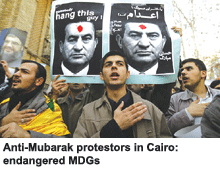 Several Middle Eastern countries such as Iraq and Yemen are unlikely to achieve the education-for-all Millennium Development Goals by 2015 because of insecurity and conflict, according to a new report of the UN Educational, Scientific and Cultural Organisation (Unesco).
Several Middle Eastern countries such as Iraq and Yemen are unlikely to achieve the education-for-all Millennium Development Goals by 2015 because of insecurity and conflict, according to a new report of the UN Educational, Scientific and Cultural Organisation (Unesco).
The education-for-all goals were endorsed by over 160 countries in 2000. But according to Kevin Watkins, director of Unesco’s Global Monitoring Report 2011, children and education are not just getting caught in the cross-fire, they are increasingly becoming targets of violent conflict. “The failure of governments to protect human rights is causing children deep harm and taking away their only chance of an education,” he warns.
The Unesco report, sub-titled The Hidden Crisis: Armed Conflict and Education, says 35 countries were affected by armed conflict between 1999 and 2008, several in the Middle East. “Children and schools are on the front line of these conflicts, with classrooms, teachers and pupils seen as legitimate targets,” it notes.
For instance, recent demonstrations and clashes in Egypt which led to the ouster of President Hosni Mubarak, also closed many schools. In mid-February, half-term was extended for two weeks. Schools in only seven of the country’s 29 governorates reopened after the recess, according to sources in Cairo. The interior ministry deployed police outside schools to beef up security and encourage a return to school, but thousands of parents still preferred to keep their children at home.
Likewise, decades of war, UN sanctions, poor security and the prevailing economic situation in Iraq have adversely affected education and increased illiteracy levels. According to data produced by the government and Unesco in September, at least 5 million of Iraq’s 30 million people are illiterate. Of these, 14 percent are children of school-going age, who left school to feed their families, are displaced or have no access to suitable schooling.
Among other Middle East countries, Bahrain is on track to achieve the goal of halving illiteracy levels by 2015, but countries like Iraq, Mauritania and Sudan are laggards. “The recent experiences of Algeria, Egypt, Kuwait and Yemen show that literacy policy can be effective: all four countries have increased their adult literacy rates by at least 20 percentage points in the past 15-20 years,” says the Unesco report.
In Yemen, a reallocation of 10 percent of the military budget to education would put an additional 840,000 children in school. In the north, 220 schools were destroyed, damaged or looted during fighting in 2009 and 2010 between government and rebel forces, according to the report. In Syria, attendance in pre-school programmes varies from less than 4 percent for children in the poorest households, to just above 18 percent for wealthy households.
“Armed conflict remains a major roadblock to human development in many parts of the world, yet its impact on education is widely neglected. This groundbreaking report documents the scale of this hidden crisis, identifies its root causes and offers solid proposals for change,” says Unesco director-general Irina Bokova.
(Excerpted and adapted from www.irinnews.org)